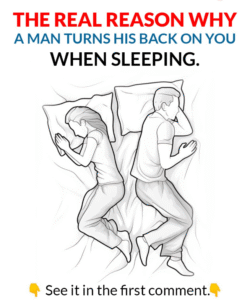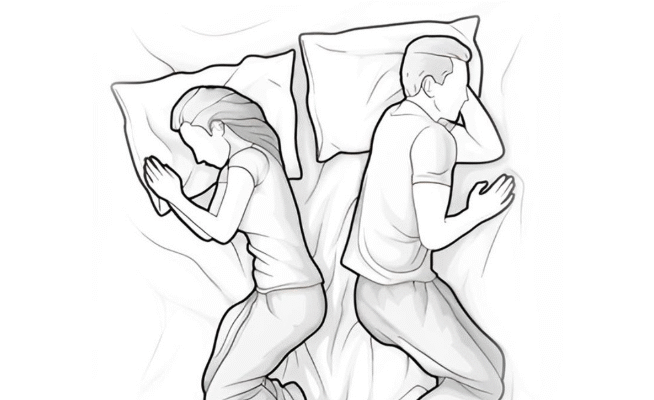When a man turns his back on you while he sleeps, it can feel confusing, even hurtful. You might lie there, staring at the ceiling, wondering if it means he’s lost interest, if he’s upset, or if something deeper is going on. But before jumping to conclusions, it’s important to understand that body language during sleep is complex — it often reflects comfort, emotional state, and personality more than conscious intent. Let’s explore the many possible meanings behind this seemingly simple act, and what it might reveal about your relationship, his inner world, and the bond you share.
1. Comfort Over Connection
One of the most common reasons a man turns his back on you at night is simple: comfort. People have preferred sleeping positions, and for many, sleeping on their side facing away is the most natural and restful. He might not be rejecting closeness at all — his body may just be seeking the position that helps him sleep best.
Men, especially those with broad shoulders or back pain, often find this posture more comfortable because it relieves pressure on the chest and allows for easier breathing. So, before assuming it’s emotional distance, remember that physical comfort usually comes first when the body is at rest.
2. The “Back-to-Back” Couple Style
Relationship experts have studied sleeping positions and found that many couples naturally adopt the “back-to-back but touching” position. This is actually a sign of a secure, independent relationship.
If your backs or legs are touching, it suggests that there’s trust and comfort between you — you don’t need to cling constantly to feel close. This sleeping style often appears in couples who have been together for a while, who feel safe and stable, and who can rest without needing constant reassurance of physical contact.
3. Emotional Distance or Disconnection
However, if he used to hold you close every night and now suddenly turns away — especially without any physical contact — it might signal emotional withdrawal. When someone is emotionally troubled, resentful, or hiding something, they sometimes create physical distance even in sleep.
The body mirrors the mind. If there’s tension between you — maybe unspoken arguments, hurt feelings, or unresolved stress — that distance can unconsciously appear at night. He might not even realize he’s doing it, but his posture could reflect a quiet wall that’s forming between you.
4. Stress, Fatigue, or Mental Overload
Sometimes, when a man is deeply stressed — by work, finances, or personal struggles — he may turn his back as a subconscious way of retreating into himself.
Men are often taught to process emotions privately, to appear strong and unaffected. Lying on his side, facing away, gives him a sense of isolation and control, a silent way to “shut off” the world and recharge. It’s not necessarily about you; it could be about his inner chaos.
If he’s been unusually quiet, tense, or distracted during the day, the position might just be his way of finding peace in solitude, even while beside you.
5. The Need for Personal Space
Relationships, no matter how loving, require breathing room. Some people simply need more personal space than others — especially during sleep, when the mind seeks rest and recovery.
Turning away can be a way to preserve individuality and comfort without rejecting affection. In fact, research shows that couples who allow each other space during sleep often report better rest and less conflict.
So, if he consistently turns his back but still shows warmth, affection, and love when awake, it’s probably not about emotional distance — it’s about balance.
6. The Subtle Comfort of Trust
Here’s another beautiful possibility: he feels safe with you. When we sleep, we’re at our most vulnerable. Turning one’s back might actually be a sign of deep trust — it shows that he feels secure enough to rest without fear, knowing you’re there.
In primitive terms, early humans would only sleep facing away from someone if they trusted that person completely to protect them. In that sense, his turned back could be the most silent form of confidence and peace he can show.
7. The Changing Rhythm of Intimacy
In long-term relationships, the rhythm of physical closeness naturally fluctuates. The early phase of passion often fades into quiet companionship, where both partners find comfort in coexistence rather than constant touch.
If you notice he turns away more often now, it doesn’t necessarily mean love has faded — it may just mean your bond has evolved. The connection is no longer proven through proximity but through presence, kindness, and shared life moments.
However, if the distance feels cold rather than calm, it may be time for a gentle conversation — not accusation, but curiosity.
8. When Silence Speaks Loudly
Sometimes, turning away is not about sleep but emotion. If there’s been a fight, misunderstanding, or unspoken resentment, the bed becomes a quiet battlefield.
Turning his back may be a way of avoiding confrontation, a shield against vulnerability. Instead of saying, “I’m hurt” or “I’m angry,” he uses silence and space.
In these moments, it’s crucial not to interpret it only as rejection but as communication in a different form. The body is saying what the mouth can’t — that something within him is unsettled. Understanding this opens the door to healing.
9. The Role of Love Languages
Each person expresses love differently. Some crave touch, others prefer words, acts, or shared time. If your love language is physical touch, his back might feel like a wall. But if his is acts of service or quality time, his affection may show elsewhere — in small gestures during the day.
Learning each other’s love language helps interpret actions more clearly. Turning his back doesn’t always mean lack of love — sometimes it means love expressed differently.
10. What You Can Do
If his sleeping position bothers you, approach the topic gently. Avoid blaming or dramatizing — instead, express your feelings:
“When you turn away, I sometimes feel distant. Can we cuddle for a bit before sleeping?”
You might be surprised how a soft conversation opens emotional doors. Most men don’t realize how much their unconscious habits affect their partners. With kindness, he’ll likely respond with warmth and reassurance.
Also, consider small adjustments — cuddling for a few minutes before turning away, or sleeping closer until you both drift off. Intimacy doesn’t have to last all night; it just needs to be genuine.
11. A Reflection of the Relationship’s Health
Over time, how you sleep together can mirror how you live together. Do you trust each other’s space? Can you feel connected even without constant contact? Do you wake up feeling safe, not anxious?
If so, his turned back is harmless — maybe even beautiful. But if it leaves you cold, lonely, or questioning, that’s worth exploring. Emotional warmth should exist both in daylight and in darkness.
12. The Gentle Truth
In the end, a man turning his back while sleeping can mean many things — comfort, habit, trust, stress, or emotional distance. The only way to truly know is to observe the full picture: how he treats you when awake, how he listens, touches, and communicates.
The body may turn away, but the heart speaks louder in the day. If his eyes still soften when they meet yours, if he still reaches for your hand in the morning, if his words carry tenderness — then his back at night is just a posture, not a problem.
Final Thought
Love isn’t measured by how tightly someone holds you in their sleep. It’s measured by how safe you feel beside them — even when their back is turned.


